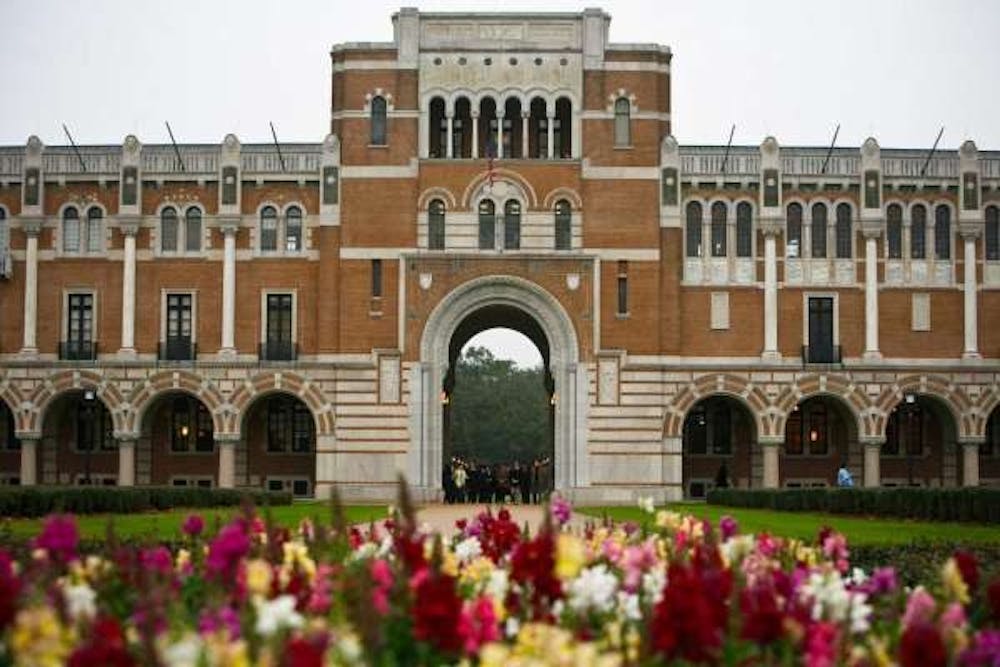Cost of undergraduate attendance will increase 3.7 percent next academic year

Rice University’s undergraduate tuition for the 2020-21 school year will rise by 4.1 percent to $50,310, an increase of $1,980 over the current year’s tuition, according to a press release on Wednesday afternoon.
The total cost of attendance, which will include $14,500 for room and board and $797 in mandatory fees, will also increase by 3.7 percent to $65,607. Both the costs for room and board and mandatory fees have increased from the current year.
Last year, the total cost of undergraduate attendance increased by 3.1 percent to $63,252 for the 2019-2020 academic year. This was mainly driven by a 3.7 percent tuition increase from $46,600 to $48,330. Room and board charges also increased by one percent from $14,000 to $14,140 and mandatory fees rose from $745 to $782 last academic year.
The cost of attendance has steadily increased over the past decade, as previously reported by the Thresher. The Chronicle of Higher Education’s database also shows a consistent increase in Rice’s cost of attendance since 1998, even when inflation rates (using national figures from the Bureau of Labor Statistics) are taken into account.
Rice officials noted in the press release that Rice will continue to meet the full financial need of undergraduate domestic students under the Rice Investment program.
“We recognize at Rice that this is an unprecedented, challenging and uncertain time for our students and their families, and for many their financial situations are in flux,” President David Leebron said. “We will continue ensuring through generous financial aid that our newly admitted and returning students will have this opportunity regardless of their financial circumstances.”
The Rice Investment, description of the investment here, took effect for the 2019-2020 school year, but students have had mixed reactions and expressed concerns. International students not receiving financial aid have expressed concerns about tuition increases. In the Thresher’s previous coverage of international student financial aid, Stephanie Kwak, a South Korean international student, said that Rice has not been generous in giving financial assistance to the international community.
“Now that they’re increasing the portion of financial aid to ... the people who have the citizenships, then that means they need more money out of us,” Kwak, a Lovett College junior, said.
The Rice Investment does not apply to international students, according to Vice President for Finance Kathy Collins. However, international students still may be offered financial aid during admission. Twenty-six percent of international students receive financial aid in the current year, according to Collins.
Graduate education costs for 2020-2021 have also increased for certain programs, including doctoral student tuition, as detailed at the end of Rice’s press release.
This story was updated on 3/26/20 at 3:12 a.m with additional information about historical increases and the Rice Investment program.
More from The Rice Thresher

Worth the wait: Andrew Thomas Huang practices patience
Andrew Thomas Huang says that patience is essential to being an artist. His proof? A film that has spent a decade in production, a career shaped by years in the music industry and a lifelong commitment to exploring queer identity and environmental themes — the kinds of stories, he said, that take time to tell right.

Andrew Thomas Huang puts visuals and identity to song
Houston is welcoming the Grammy-nominated figure behind the music videos of Björk and FKA twigs on June 27.

Live it up this summer with these Houston shows
Staying in Houston this summer and wondering how to make the most of your time? Fortunately, you're in luck, there's no shortage of amazing shows and performances happening around the city. From live music to ballet and everything in between, here are some events coming up this month and next!

Please note All comments are eligible for publication by The Rice Thresher.